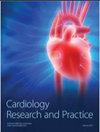肥厚性心肌病患者植入式心律转复除颤器的并发症及其潜在危险因素
IF 1.8
4区 医学
Q3 CARDIAC & CARDIOVASCULAR SYSTEMS
引用次数: 0
摘要
背景。肥厚性心肌病(HCM)有不同的并发症,如心律失常和心脏性猝死(SCD)。对于SCD和恶性心律失常高风险的HCM患者,尽管存在潜在的并发症,但仍建议植入植入式心律转复除颤器(ICD)。假设。我们的目的是在一年的随访期间调查ICD插入的不同并发症的患病率以及潜在的影响基线特征的影响。方法。这是一项回顾性研究,共有71例植入ICD的HCM患者。我们通过3个4个月的多变量回归分析来评估ICD植入不同并发症的发生率以及基线特征对ICD并发症发生的影响。结果。在一年的随访中,13例患者(18.3%)出现了至少一种并发症,包括气胸、导联衰竭、ICD感染、不适当的电击、穿孔和上肢深静脉血栓形成(DVT),无死亡。在此期间,不适当的电击是最常见的并发症(11.3%),在第二次随访(4.2%)和第三次随访(5.6%)中逐渐增加。在本研究调查的所有基线特征中,高血压病史是唯一对并发症发生有显著影响的危险因素(P = 0.01)。结论。我们发现在一年的随访中,植入ICD的HCM患者的并发症发生率为18.3%。高血压病史是影响并发症发生的唯一基线特征,不适当的电击是最常见的并发症。本文章由计算机程序翻译,如有差异,请以英文原文为准。
Complications of Implantable Cardioverter Defibrillator and Their Potential Risk Factors in Patients with Hypertrophic Cardiomyopathy
Background. Hypertrophic cardiomyopathy (HCM) has different complications such as cardiac arrhythmia and sudden cardiac death (SCD). Insertion of an implantable cardioverter defibrillator (ICD) is recommended for HCM patients who are at high risk of SCD and malignant arrhythmias, despite having their own potential complications. Hypothesis. We aimed to investigate the prevalence of different complications of ICD insertion and the impact of the potential influential baseline characteristics in a one-year follow-up period. Methods. This was a retrospective study with a total of 71 HCM patients with ICD insertion. We evaluated the prevalence of different complications of ICD implantation and the impact of baseline characteristics on the occurrence of ICD complications using multivariate regression analysis in three 4-month periods. Results. In a one-year follow-up, 13 patients (18.3%) experienced at least one of the complications including pneumothorax, lead failure, ICD infection, inappropriate shocks, perforation, and upper limb deep vein thrombosis (DVT) with no mortality. Inappropriate shocks were reported as the most common (11.3%) complication during this period, with a gradual increase in the second (4.2%) and third (5.6%) follow-up sessions. Among all of the baseline characteristics that were investigated in this study, a positive history of hypertension was the only risk factor with significant impact on the occurrence of complications ( = 0.01). Conclusion. We demonstrated the occurrence of complications during a one-year follow-up as 18.3% in HCM patients with ICD insertion. A positive history of hypertension was the only baseline characteristic affecting the occurrence of complications, and inappropriate shocks were the most common complication.
求助全文
通过发布文献求助,成功后即可免费获取论文全文。
去求助
来源期刊

Cardiology Research and Practice
Medicine-Cardiology and Cardiovascular Medicine
CiteScore
4.40
自引率
0.00%
发文量
64
审稿时长
13 weeks
期刊介绍:
Cardiology Research and Practice is a peer-reviewed, Open Access journal that publishes original research articles, review articles, and clinical studies that focus on the diagnosis and treatment of cardiovascular disease. The journal welcomes submissions related to systemic hypertension, arrhythmia, congestive heart failure, valvular heart disease, vascular disease, congenital heart disease, and cardiomyopathy.
 求助内容:
求助内容: 应助结果提醒方式:
应助结果提醒方式:


